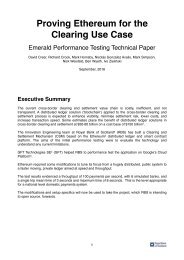Bitcoin and Cryptocurrency Technologies
1Qqc4BN
1Qqc4BN
Create successful ePaper yourself
Turn your PDF publications into a flip-book with our unique Google optimized e-Paper software.
in turn sends it to all of its peer nodes. Nodes that hear about a transaction put it in a pool of<br />
transactions which they’ve heard about but that aren’t on the block chain yet. If a node hears about a<br />
transaction that’s already in its pool, it doesn’t further broadcast it. This ensures that the flooding<br />
protocol terminates <strong>and</strong> transactions don’t loop around the network forever. Remember that every<br />
transaction is identified uniquely by its hash, so it’s easy to look up a transaction in the pool.<br />
When nodes hear about a new transaction, how do they decide whether or not they should propagate<br />
it? There are four checks. The first <strong>and</strong> most important check is transaction validation — the<br />
transaction must be valid with the current block chain. Nodes run the script for each previous output<br />
being redeemed <strong>and</strong> ensure that the scripts return true. Second, they check that the outputs being<br />
redeemed here haven’t already been spent. Third, they won’t relay an already-seen transaction, as<br />
mentioned earlier. Fourth, by default, nodes will only accept <strong>and</strong> relay “st<strong>and</strong>ard” scripts based on a<br />
small whitelist of scripts.<br />
All these checks are just sanity checks. Well-behaving nodes all implement these to try to keep the<br />
network healthy <strong>and</strong> running properly, but there’s no rule that says that nodes have to follow these<br />
specific steps. Since it’s a peer-to-peer network, <strong>and</strong> anybody can join, there’s always the possibility<br />
that a node might forward double-spends, non-st<strong>and</strong>ard transactions, or outright invalid transactions.<br />
That’s why every node must do the checking for itself.<br />
Since there is latency in the network, it’s possible that nodes will end up with a different view of the<br />
pending transaction pool. This becomes particularly interesting <strong>and</strong> important when there is an<br />
attempted double-spend. Let’s say Alice attempts to pay the same bitcoin to both Bob <strong>and</strong> Charlie,<br />
<strong>and</strong> sends out two transactions at roughly the same time. Some nodes will hear about the Alice →<br />
Bob transaction first while others will hear about the Alice → Charlie transaction first. When a node<br />
hears either of these transactions, it will add it to its transaction pool, <strong>and</strong> if it hears about the other<br />
one later it will look like a double-spend. The node will drop the latter transaction <strong>and</strong> won’t relay it<br />
or add it to its transaction pool. As a result, the nodes will temporarily disagree on which transactions<br />
should be put into the next block. This is called a race condition.<br />
The good news is that this is perfectly okay. Whoever mines the next block will essentially break the<br />
tie <strong>and</strong> decide which of those two pending transactions should end up being put permanently into a<br />
block. Let’s say the Alice → Charlie transaction makes it into the block. When nodes with the Alice →<br />
Bob transaction hear about this block, they’ll drop the transaction from their memory pools because it<br />
is a double-spend. When nodes with the Alice → Charlie transaction hear about this block, they’ll<br />
drop the transaction from their memory pools because it’s already made it into the block chain. So<br />
there will be no more disagreement once this block propagates to the network.<br />
Since the default behavior is for nodes to hang onto whatever they hear first, network position<br />
matters. If two conflicting transactions or blocks get announced at two different positions in the<br />
network, they’ll both begin to flood throughout the network <strong>and</strong> which transaction a node sees first<br />
will depend on where it is in the network.<br />
91









